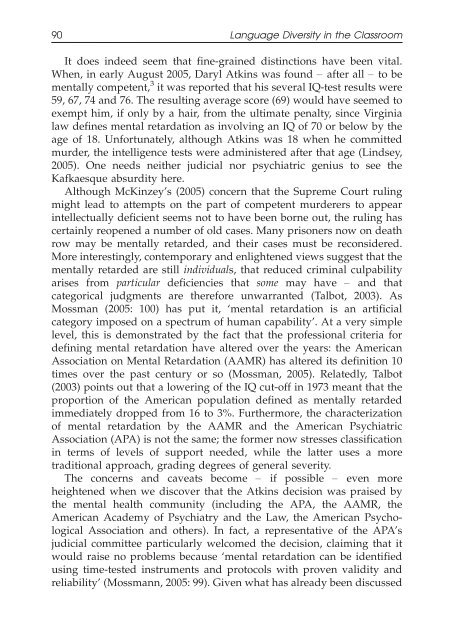Language Diversity in the Classroom - ymerleksi - home
Language Diversity in the Classroom - ymerleksi - home
Language Diversity in the Classroom - ymerleksi - home
- No tags were found...
You also want an ePaper? Increase the reach of your titles
YUMPU automatically turns print PDFs into web optimized ePapers that Google loves.
90 <strong>Language</strong> <strong>Diversity</strong> <strong>in</strong> <strong>the</strong> <strong>Classroom</strong>It does <strong>in</strong>deed seem that f<strong>in</strong>e-gra<strong>in</strong>ed dist<strong>in</strong>ctions have been vital.When, <strong>in</strong> early August 2005, Daryl Atk<strong>in</strong>s was found after all to bementally competent, 3 it was reported that his several IQ-test results were59, 67, 74 and 76. The result<strong>in</strong>g average score (69) would have seemed toexempt him, if only by a hair, from <strong>the</strong> ultimate penalty, s<strong>in</strong>ce Virg<strong>in</strong>ialaw def<strong>in</strong>es mental retardation as <strong>in</strong>volv<strong>in</strong>g an IQ of 70 or below by <strong>the</strong>age of 18. Unfortunately, although Atk<strong>in</strong>s was 18 when he committedmurder, <strong>the</strong> <strong>in</strong>telligence tests were adm<strong>in</strong>istered after that age (L<strong>in</strong>dsey,2005). One needs nei<strong>the</strong>r judicial nor psychiatric genius to see <strong>the</strong>Kafkaesque absurdity here.Although McK<strong>in</strong>zey’s (2005) concern that <strong>the</strong> Supreme Court rul<strong>in</strong>gmight lead to attempts on <strong>the</strong> part of competent murderers to appear<strong>in</strong>tellectually deficient seems not to have been borne out, <strong>the</strong> rul<strong>in</strong>g hascerta<strong>in</strong>ly reopened a number of old cases. Many prisoners now on deathrow may be mentally retarded, and <strong>the</strong>ir cases must be reconsidered.More <strong>in</strong>terest<strong>in</strong>gly, contemporary and enlightened views suggest that <strong>the</strong>mentally retarded are still <strong>in</strong>dividuals, that reduced crim<strong>in</strong>al culpabilityarises from particular deficiencies that some may have and thatcategorical judgments are <strong>the</strong>refore unwarranted (Talbot, 2003). AsMossman (2005: 100) has put it, ‘mental retardation is an artificialcategory imposed on a spectrum of human capability’. At a very simplelevel, this is demonstrated by <strong>the</strong> fact that <strong>the</strong> professional criteria fordef<strong>in</strong><strong>in</strong>g mental retardation have altered over <strong>the</strong> years: <strong>the</strong> AmericanAssociation on Mental Retardation (AAMR) has altered its def<strong>in</strong>ition 10times over <strong>the</strong> past century or so (Mossman, 2005). Relatedly, Talbot(2003) po<strong>in</strong>ts out that a lower<strong>in</strong>g of <strong>the</strong> IQ cut-off <strong>in</strong> 1973 meant that <strong>the</strong>proportion of <strong>the</strong> American population def<strong>in</strong>ed as mentally retardedimmediately dropped from 16 to 3%. Fur<strong>the</strong>rmore, <strong>the</strong> characterizationof mental retardation by <strong>the</strong> AAMR and <strong>the</strong> American PsychiatricAssociation (APA) is not <strong>the</strong> same; <strong>the</strong> former now stresses classification<strong>in</strong> terms of levels of support needed, while <strong>the</strong> latter uses a moretraditional approach, grad<strong>in</strong>g degrees of general severity.The concerns and caveats become if possible even moreheightened when we discover that <strong>the</strong> Atk<strong>in</strong>s decision was praised by<strong>the</strong> mental health community (<strong>in</strong>clud<strong>in</strong>g <strong>the</strong> APA, <strong>the</strong> AAMR, <strong>the</strong>American Academy of Psychiatry and <strong>the</strong> Law, <strong>the</strong> American PsychologicalAssociation and o<strong>the</strong>rs). In fact, a representative of <strong>the</strong> APA’sjudicial committee particularly welcomed <strong>the</strong> decision, claim<strong>in</strong>g that itwould raise no problems because ‘mental retardation can be identifiedus<strong>in</strong>g time-tested <strong>in</strong>struments and protocols with proven validity andreliability’ (Mossmann, 2005: 99). Given what has already been discussed
















